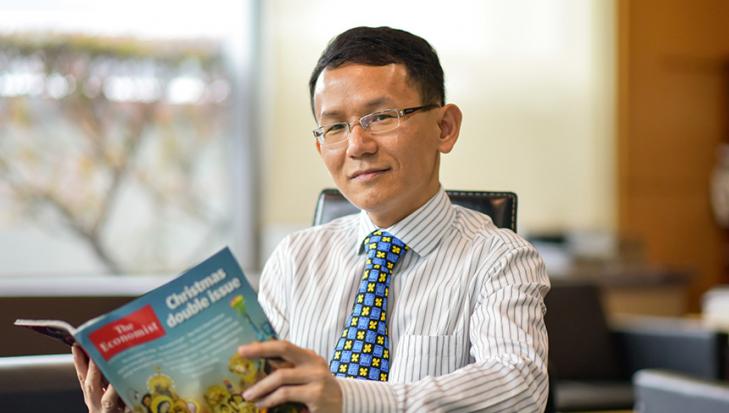
SMU Associate Professor Ho Kong Weng studies the driving forces and trends underlying socioeconomic mobility in Singapore.

Photo Credit: Cyril Ng
By Grace Chua
SMU Office of Research – Every parent is concerned whether their children will be as well-off as they are, or hopefully even better off. While Singapore was successful in raising each generation’s living standards in its early years of independence, Associate Professor Ho Kong Weng’s research at the Singapore Management University (SMU) School of Economics says this may no longer be true today.
Using decade-long findings from the National Youth Survey of students and working youths’ concern, Professor Ho and colleagues found that parents’ income and occupations were major factors that predicted how long youths would stay in school and the occupations and incomes they would eventually achieve.
Waning intergenerational mobility
Professor Ho is worried that the trend of waning intergenerational mobility is becoming more entrenched over time, causing a gap to widen between the higher- and lower-income groups. He says that Singapore’s high upward mobility across the board in the past was the result of rapid economic growth, starting from a low base where few people had any higher education.
“As Singapore matures into a more advanced economy, the growth is skills-biased, and the chances of children from lower-income groups moving up may be diminished – not zero, but diminished,” he comments.
Skills-biased growth will benefit those who have higher skills, such as professionals, he says, and attract new residents and workers who have a higher average level of skills than Singaporeans. These groups will also be more able to invest in their children’s education, such as by sending them to international schools or enrichment centres – all of which are likely to widen the wage gap, Professor Ho explains.
Another reason for waning intergenerational mobility, he says, is the evolution of Singapore’s education ‘marketplace’. For instance, more well-to-do parents are now sending their Singaporean children to home-grown international schools, which come with a hefty price tag. Already, Professor Ho points out, wealthy parents have long been able to move nearer to desirable primary schools that funnel children into top secondary schools.
“Some people might call this liberalisation or ‘marketisation’ – as the educational sector becomes more pro-market, there’s more autonomy given to more schools like independent schools, autonomous schools and integrated-programme schools, and parents’ influence may matter more,” he says.
Finally, a rising family disruption rate, such as divorce, also has a negative impact on children’s educational attainment, as children from such families may have less family support for their schooling needs.
If intergenerational mobility is on the decline, what can Singapore do to reverse the trend?
One way to boost mobility is to provide more bursaries, Professor Ho says. “Scholarships are more like recognition of academic merit, but bursaries will help much more in human capital investment.”
He also suggests targeted policies to help children from disadvantaged families, similar to current government schemes for preschool or kindergarten assistance, and family life education programmes to strengthen families and ward off divorce.
A question of personal experience
For Professor Ho, intergenerational mobility also happens to be a matter of personal experience. His father, who is now retired, was a dock worker, while his mother still works part-time as a cleaner at a clinic, not for the money but to stay active socially.
“My dad was born in China, and came here because of famine in China. My grandfather had come over first, and my father was bullied back home because his parents were away,” Professor Ho says. “My parents had no formal education, yet their child has a PhD. I tell my students that this is an example of upward mobility of a whole generation.”
He counts Professor Hoon Hian Teck, Associate Dean (Faculty Research) at SMU School of Economics, as a mentor. During his undergraduate studies at the National University of Singapore (NUS), then lecturer Professor Hoon encouraged him to further his PhD studies, which he did at the University of Chicago on a NUS overseas graduate scholarship.
Today, Professor Ho teaches a course in the macroeconomics of income distribution – the first such undergraduate course in Singapore. He consults for government bodies such as the Ministry of Social and Family Development, to evaluate programmes that help low-income families, and the Housing Development Board, to understand the role of public housing in social mobility and social integration.
The middle-income squeeze
Lately, he has been studying the ‘middle-income squeeze’ – middle-income groups’ attitudes and perceptions related to inequality – drawing on data from the World Values Survey 2012, a global survey of values and beliefs.
Based on research that he presented at a workshop at NUS last year, Professor Ho found that the middle-income group in Singapore has the weakest sense of national pride and belonging to the country, and was least supportive of redistributing income through taxation.
He notes that while the middle-income group shouldn’t be subsidised too much as the burden of such a large government subsidy would be too heavy, there should be fair opportunity for people at each income level to move up the income ladder.
Ask the father of two boys aged 9 and 11, who met his homemaker wife in their church choir, whether he worries about intergenerational mobility on their behalf, and he says: “As parents, we invest in our children. We are concerned not just about their ability to get a job but also their character building and having purpose in life. Personally, I think the non-economic aspect is more important.”